|
|
|
Sort Order |
|
|
|
Items / Page
|
|
|
|
|
|
|
| Srl | Item |
| 1 |
ID:
174543
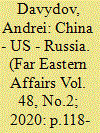

|
|
|
|
|
| Summary/Abstract |
This article describes the recent events in the relations between China, the United States, and Russia (the "Big Three" in the struggle to shape a new world order), their role and potentialities in the process under conditions of the raging coronavirus pandemic, and the development prospects for their relations in the foreseeable future.
|
|
|
|
|
|
|
|
|
|
|
|
|
|
|
|
| 2 |
ID:
146025
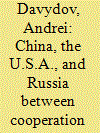

|
|
|
|
|
| Summary/Abstract |
The author analyzes sensitive issues (i.e. pressing problems) in mutual relations between China and Russia, and China and the U.S.A. He also assesses the development prospects of U.S.-PRC-RF ties amid a changing global architecture
|
|
|
|
|
|
|
|
|
|
|
|
|
|
|
|
| 3 |
ID:
170642


|
|
|
|
|
| Summary/Abstract |
This article considers the countries of the so-called "Big Three" and the relations among them today. An attempt is made to predict the places and roles of the three countries in reworking the world order, based on the views they hold and features of the existing and future world order. Recommendations are made for their optimization and building harmonious relations capable of establishing a durable and long-lasting peace.
|
|
|
|
|
|
|
|
|
|
|
|
|
|
|
|
| 4 |
ID:
110048
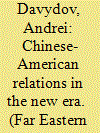

|
|
|
|
|
| Publication |
2011.
|
| Summary/Abstract |
The article analyzes relations between China and the United States over the last two and a half years. The author concludes that as a result of laborious negotiations, the two sides have now managed to develop a kind of paradigm for reciprocal behaviour that allows them to settle problems and disagreements arising between them on a non-confrontational basis. In preparing this article, the author used data from works he published earlier, along with analytic materials from the Russian Academy of Sciences' Institute for Far Eastern Studies that he helped compile.
|
|
|
|
|
|
|
|
|
|
|
|
|
|
|
|
| 5 |
ID:
167734
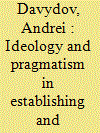

|
|
|
|
|
| Summary/Abstract |
This is a review of the main stages of rapprochement and improvement of relations between China and the U.S. after a long period of alienation and enmity. An attempt has been made to analyze the correlation of pragmatic and ideological motivations in the process of this rapprochement, which culminated in 1979 in the establishment of diplomatic relations between the United States of America and the People's Republic of China. The U.S.-Chinese differences at the present stage are characterized and future development prospects are briefly analyzed.
|
|
|
|
|
|
|
|
|
|
|
|
|
|
|
|
| 6 |
ID:
087644
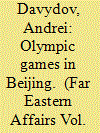

|
|
|
|
|
| Publication |
2009.
|
| Summary/Abstract |
It is generally recognized that the relations between the United States and China today are extremely important. As is known, they are characterized not only by interaction and cooperation, but also an acute rivalry, which resembles an iceberg: only a small part of it is visible, while the real confrontation between the two countries is hidden, not to be seen by the general public.
In August 2008, this hidden American-Chinese confrontation reached its peak and marked a qualitatively new stage in the relations between the two countries. We mean the 29th Olympic Games held in Beijing.
It would seem that the Olympic Games as a purely sports event should demonstrate what country could be regarded the leading sports power of the world for the current four-year period. In actual fact, however, everything is more serious: the modern Olympics have long turned into a yardstick of not only the sport status, but also the international status of one or another state, its position, weight and prestige in the world hierarchy.
In this sense, the Beijing Games were no exception. The victory scored by the Chinese team which won the greatest number of gold medals has not only "legitimized" China's becoming the new sports leader of the world, but also strengthened its position as a leading world power capable to throw a real challenge to the global hegemony of the United States of America.
Let us turn to historical analogy: soon after the brilliant performance of the Soviet team at the Melbourne Olympics in 1956, people began to talk of the
|
|
|
|
|
|
|
|
|
|
|
|
|
|
|
|
| 7 |
ID:
124201
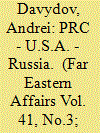

|
|
|
|
|
| Publication |
2013.
|
| Summary/Abstract |
This article outlines the main trends in the foreign policy of the PRC, the U.S.A., and Russia, and gives an overview of development prospects for their relations on the basis of generalizing the main specific features of the domestic situation there.
|
|
|
|
|
|
|
|
|
|
|
|
|
|
|
|
| 8 |
ID:
183432
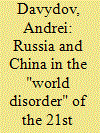

|
|
|
|
|
| Summary/Abstract |
This article analyzes the advisability of transforming the partnership relations between Russia and China into an alliance with an emphasis on the military aspect of their cooperation. The author considers points testifying to the inadvisability and irrationality of concluding such an alliance in the context of today's global situation, where a new world order has yet to form conclusively. With regard to the alliance between the Soviet Union and China of the 1950s and '60s, the author concludes that one of the factors leading to its breakup at that time was the Soviet leadership failing to understand items associated with the history of Chinese civilization that would allow the creation of a specific Chinese "psychotype." This eventually became the main reason for the incompatibility of the national mentalities in the Soviet Union and China, affecting the durability of the two countries' alliance in the middle of the 20th century. The author uses data from Chinese experts to emphasize the predominance in Chinese academic circles of the opinion that it is better to maintain a strategic partnership between the two countries, and there is no need to transform it into an alliance.
|
|
|
|
|
|
|
|
|
|
|
|
|
|
|
|
| 9 |
ID:
082852


|
|
|
|
|
| Publication |
2008.
|
| Summary/Abstract |
One of the most important foreign policy events of the year 2007 was RF President Vladimir Putin's February speech at the Munich Conference, signifying a unique turning point in Russia's relations with the West. ... The Russian leader's sharp criticism of the United States for its uncontrolled use of force in international affairs, and for its "unilateral, illegal actions" leading to the outbreak of wars and minor conflicts, had such a powerful and wide international response that all other events, dates, and facts that, under different circumstances would really deserve being recalled, were pushed into the background
|
|
|
|
|
|
|
|
|
|
|
|
|
|
|
|
|
|
|
|
|